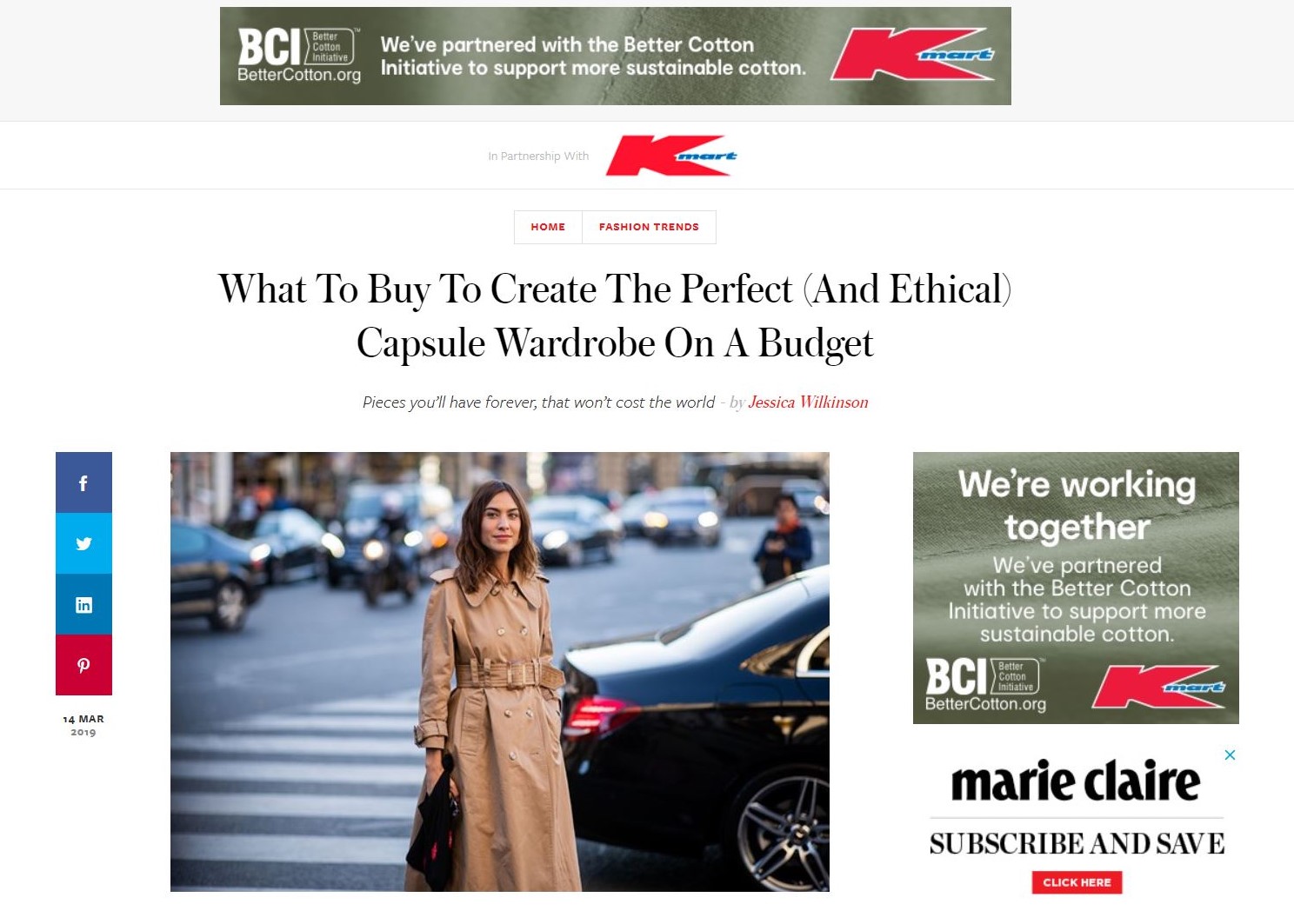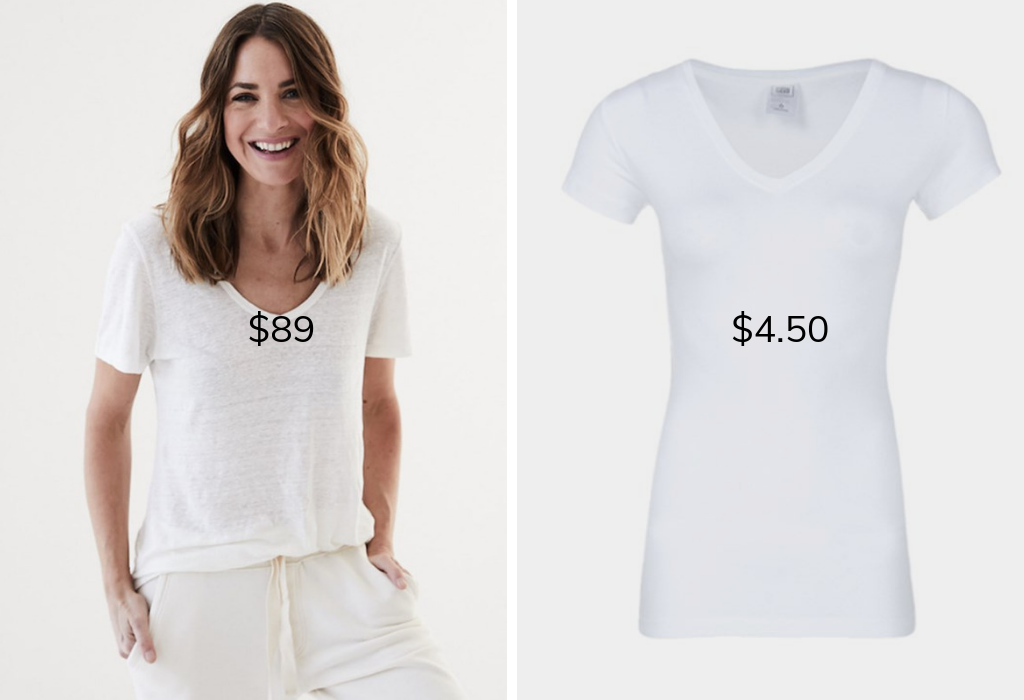Earlier this month Marie Claire Australia published this: “What To Buy To Create The Perfect (And Ethical) Capsule Wardrobe On A Budget.”
Marie Claire is promoting Kmart’s recent partnership with the Better Cotton Initiative, a not-for-profit organisation working with brands to address the negative impacts of mainstream cotton production. Which promises to “kick start your ethical capsule wardrobe” with budget-friendly items.
The piece is clearly sponsored by Kmart, and while I don’t begrudge them the brand partnership (hey, it’s how I make a living), the problem is that this content is a case of serious greenwashing disguised as a cute, ethical basics luxe vs less style piece.

What is greenwashing?
Greenwashing: Falsely leading consumers to believe that a brand’s products or policies are ethical or environmentally friendly. – The Green Hub
The True Cost of Fashion
The comparison of Kmart’s clothes with well known, ethically accredited brands grossly misrepresents the true cost of clothing. That’s the real issue here.
“Pieces you’ll have forever, that won’t cost the world. Your budget-friendly go-to’s are also focused on sustainable sourcing and ethical design.” – Marie Claire
I call bullshit.
There were several brands included in this article, but I’m going to use Organic Crew as an example.
$89 vs. $4.50
Organic Crew is a Melbourne fashion label who create ethical basics and loungewear. Each piece is made using GOTS Certified organic cotton and manufactured in Australia in factories accredited by Ethical Clothing Australia.
Organic Crew prioritise worker welfare and every single person involved in their supply chain from cotton seed to finished garment is paid a living wage. The use of organic cotton over conventional cotton farming practices uses less water, no GMO crops, or harmful synthetic pesticides, insecticides, or herbicides which minimises their environmental impact.
In true sustainable style, Organic Crew design for durability and longevity ensuring your investment will not shrink, fade, pill, or come unraveled after a few wash and wears.
Paying living wages, using environmentally friendly fabrics, applying for ethical certifications and accreditations, none of these come cheap. And having worked with many ethical fashion brands, let me assure you there is no inflated markup, and the brand’s profit margins are often tiny.

In contrast, Kmart’s $4.50 t-shirt is made from conventional GMO cotton, and I have absolutely no idea where it was made or who made it.
Is Kmart ethical and/or sustainable?
Kmart has a published factory list but I couldn’t tell you which one the t-shirt was made in. Also not sure if the list is just their first-tier suppliers or every single factory they manufacture in. Who’s decided on their code of conduct? Who is enforcing it? Is it an independent third party? Do they outsource work to other factories? Are those factories audited?
What about sustainability?
There is nothing sustainable about fast fashion’s churn model, pumped quickly through stores to maximise on current trends.
So many questions and now I’m getting tired.
The onus should not be on consumers to do hours of detective work to buy a simple t-shirt.
According to Oxfam’s Made in Poverty Report, garment workers in Bangladesh and Vietnam are paid appallingly low wages (i.e. minimum wage) in the garment sector are trapping workers and their families in a cycle of poverty. And Kmart is one of the worst offenders.
Good On You rates Kmart as “Good” for labour conditions based on Baptist World Aid’s 2019 report which score them a B+, based on a combination of traceability and transparency, auditing and supplier relationships, and worker empowerment.
It’s important to note; worker empowerment scored a D+. How can a brand have an overall B+ or ‘Good’ rating when garment workers have no autonomy over their own lives? Shouldn’t that be the most important metric?
Better cotton initiative
Joining the Better Cotton Initiative, Kmart promises to source 100% of their cotton more sustainably by July 2020. Unfortunately, their Better Together page is just a bunch of vague promises so I can’t tell you exactly what their plans are to improve environmental sustainability and worker rights.
Ethical fashion on a budget
I know that ethical fashion can be expensive and not accessible to everyone. If Kmart is the best option for you right now, please don’t feel as though you’re doing the wrong thing by shopping with them. Do the best you can with what you have.
You don’t need to boycott a brand to have an impact. Use your voice. It’s pretty powerful.
Write to Kmart (or any brand who needs to do better) and tell them the people who make our clothes need to be paid a living wage. To make it easier for you, use an email template from Fashion Revolution’s site here. You can also add your name to Oxfam’s What She Makes campaign here.
One final note. I found this statement on Kmart’s ethical sourcing page:
“We aim to provide great products at the lowest prices for our customers while respecting human rights.” But how? How can you pay every single person in your supply chain a living wage and consider your environmental impact when your t-shirts cost $4.50? It doesn’t add up!
What are your thoughts on the greenwashing issue?


